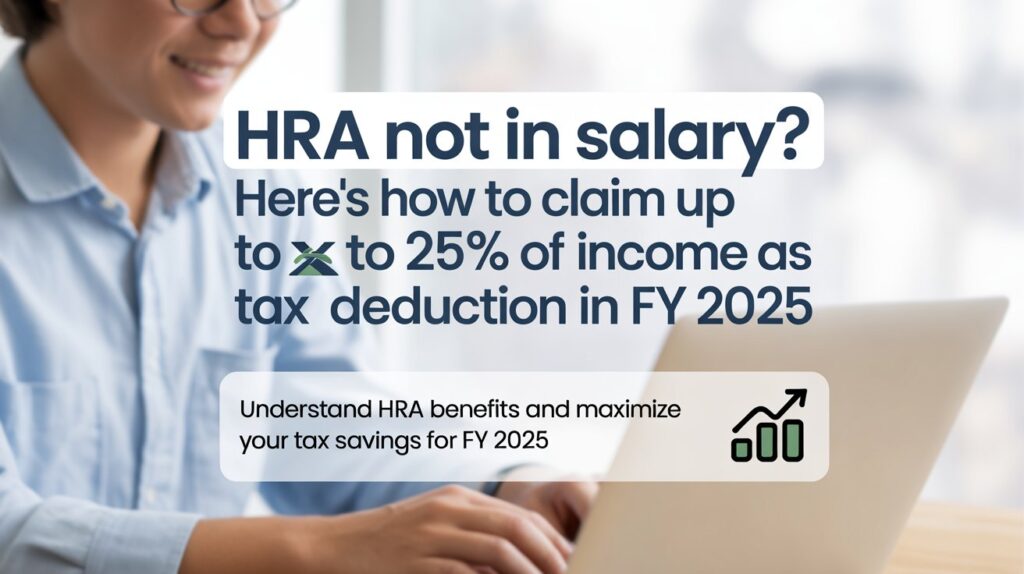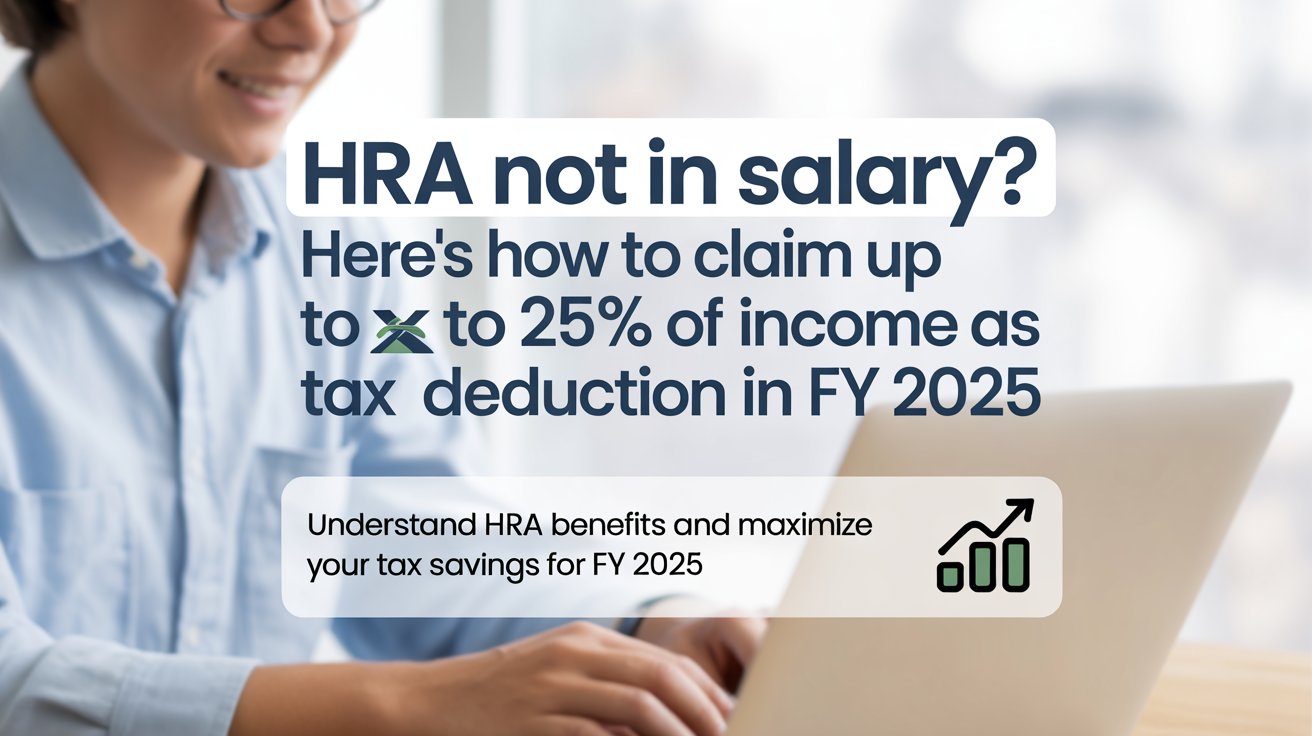I’m a salaried person like you and also know the importance of tax-saving deductions when it comes to minimizing our tax outgo. House Rent Allowance (HRA) is one of the major tax saving tools for employees on a monthly basis. But what if your salary structure lacks any HRA component? Most of us harbor the misperception that if we don’t get HRA as part of salary, then no tax benefit is available on rent paid. But that’s not quite right.
In this post, I will discuss how you can still avail tax relief on rent paid even when HRA is not a part of your salary. By using those resources correctly, you could save up to 25% of your income from taxation in FY 2025. Let’s dive into the details.

What is HRA and Its Tax Benefits?
Before we discuss other options, let’s talk about how HRA works. This HRA is a portion of the salary given by the employers to pay the rent. Under this policy you can save tax under Section 10(13A) of the Income Tax Act, 1961 on the most of the following parameters: (i).
- Full HRA given by your employer.
- The rent paid minus 10% of your basic salary.
- 50% of the Basic salary in case of metro cities and 40% for non metro cities.
But what if your pay slip does not talk about HRA? Does it mean you cannot avail this benefit? Not necessarily.
How to Claim Rent Deduction in ITR if HRA is not Received?
In case, if HRA is not offered by your employer, here’s how you can still get tax benefits under section 80GG of the Income Tax Act. This is especially for salaried, non salaried individuals who do not get House Rent Allowance (HRA) and pay rent for their accommodation.
Conditions to be fulfilled for section 80GG
- In order to avail deductions under Section 80GG, certain conditions need to be satisfied:
- You have to be employed or self-employed.
- You may not receive HRA anytime in the financial year.
- No you, your spouse or your minor child own a residential property in the city where you are taking rent.
- An agreement for rent and in some instances, Form 10BA stating the rent paid needs to be provided by you.
How much can you save under section 80GG?
The deduction available under Section 80GG will be the least of:
- ₹5,000 per month (₹60,000 a year).
- 25 percent of your adjusted gross income (after standard deductions).
- The amount of rent paid minus 10% of your total income.
If, for instance, your annual income is ₹8,00,000 and you pay ₹1,00,000 in rent, the calculation would be:
- Option 1:₹ 5,000 x 12 = ₹ 60,000
- Option 2: 25% of 8,00,000 = ₹2,00,000
- Option 3: ₹1,00,000 (rent) – 10% of ₹8,00,000 (₹80,000) = ₹20,000
The minimum of these three is ₹20,000, and that happens to be the amount you can claim as a deduction.
What are the Procedures to Avail Tax Deduction Under Section 80GG?
Keep Good Rent Receipts – Get the rent agreement and the rent receipts from your landlord. If your annual rent exceeds ₹1,00,000, you would require his PAN details.
Mention Rent Paid in ITR – At the time to file your Income Tax Return (ITR), enter the same in the section of ‘Deductions’.
Submit Form 10BA – It’s a self-declaration form stating that you do not own a house in a city where you make a claim for rent.
Getting The Maximum Tax Benefit Without HRA
Section 80GG has a limit of ₹60,000 a year and may not be sufficient to cover the entire rent you pay, especially in cities with a higher cost of living. Here are some other ways to maximize your tax savings:
1. Choose a Salary Structure Involving HRA.
If you can, try and talk to your employer, restructuring your salary to include HRA. Even if the HRA component is negligible, it can help you claim higher deductions than what you could have under Section 80GG.
2. Claim Home Loan Benefits (if any)
If you own a home in a different city but live in a rented place because of work, you can keep receipts for both:
- Home loan interest deduction (Section 24) – Maximum ₹2 lakh in a year.
- Principal repayment deduction (Section 80C) – Maximum ₹1.5 lakh a year.
This will allow you to offset your tax savings between real estate investment and rent payments.
3. Explore Other Deductions
Club Section 80GG with other deductions such as:
- Standard Deduction (₹50,000): This is applicable for all salaried persons.
- Section 80C (₹1.5 lakh): On investments in PPF, ELSS, EPF etc.
- Section 80D (Health Insurance Premiums): Till ₹1 lakh (only if insured include parents) on family cover.
You’re also taking advantage of multiple deductions which should help get your taxable income much smaller.
Common Mistakes to Avoid
Taxpayers frequently make mistakes on rent deductions that trigger review or denial. Here’s what to watch out for:
1. Not Having a Valid Rent Agreement
You need a rent agreement, especially if you’re claiming for a significant sum. If it isn’t, the Income Tax Department can (and has) disallowed the claim.
2. Availing Landlord’s PAN Number in case of High Rent Payments
If your annual rent is above ₹1,00,000 you need to mention your landlord’s PAN. Otherwise, you might not be allowed to claim the deduction.
3. Claiming HRA and 80GG – Wrong practice to be avoided
You cannot avail both HRA and Section 80GG at the same time. Even if your salary is very low and you have any quantum of HRA component in your salary, you have to opt for Section 10(13A) in place of Section 80GG.
4. Being a Homeowner in Same City
Section 80GG does not apply to you if you or your spouse/ minor child owns residential property at the place of employment.
Final Thoughts
You need not miss out on tax benefits for rent paid, just because you don’t get HRA as part of your salary. Using Section 80GG, you can still avail of a tax deduction of up to ₹60,000 per year— and hence save a large chunk of your income from tax liability.
To ensure that you save the maximum, keep the correct rent receipts and show the right deductions in your ITR as well as explore other tax-saving trails. If it is possible to revamp your salary structure to pay HRA, it can be even more tax-efficient.
Tax planning is something to ponder, and these rules will help you make educated choices. If you’re not sure which is best or you want to find out more, then a tax adviser will be able to work with you and provide you with tailored advice based on your circumstances.
By making the right moves, you can get back on a legal path to reduce your tax bill and keep more of your resources in FY 2025.

